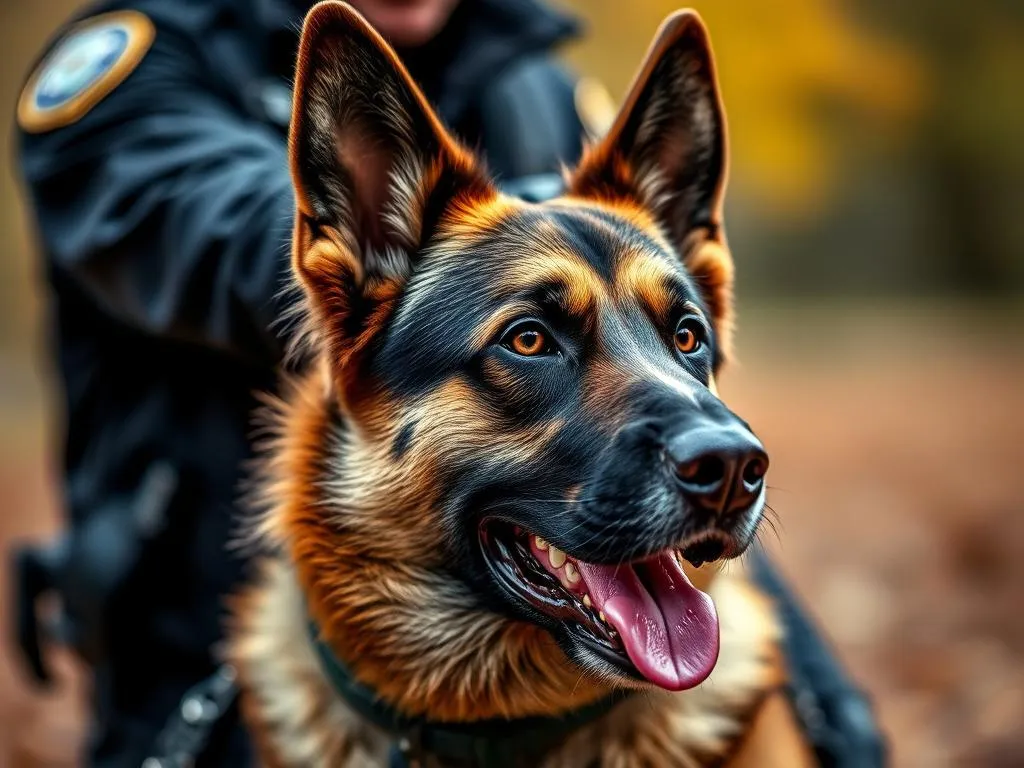
Introduction
Police dog training plays a crucial role in modern law enforcement, ensuring that canines are effective partners in maintaining public safety. How to become a police dog trainer involves understanding the intricacies of training both dogs and their human handlers. A police dog trainer is responsible for imparting essential skills to dogs, enabling them to assist in various tasks, from detecting narcotics to apprehending suspects. The effectiveness of police dogs is directly linked to the quality of their training, making the role of the trainer indispensable.
Understanding the Role of a Police Dog Trainer
A police dog trainer is a specialized professional who trains dogs to perform tasks that support law enforcement operations. This role encompasses several responsibilities, including training dogs for detection, patrol duties, and search and rescue missions.
Types of Police Dogs
There are various types of police dogs, each trained for specific functions:
- Detection Dogs: These dogs are trained to detect substances such as drugs, explosives, or even currency.
- Patrol Dogs: These canines assist in apprehending suspects and can be trained for bite work.
- Search and Rescue Dogs: These dogs specialize in locating missing persons or finding evidence at crime scenes.
Key Responsibilities
The responsibilities of a police dog trainer include:
- Training Officers and Dogs: Providing comprehensive training to both the dog and their handler, ensuring effective teamwork.
- Evaluating Dog Behavior and Performance: Assessing the dog’s progress and making necessary adjustments to their training regimen.
- Conducting Ongoing Training and Assessments: Continuously evaluating and updating the training protocols to meet law enforcement needs.
Qualifications and Skills Required
Educational Background
To pursue a career as a police dog trainer, an educational background in fields such as animal science, psychology, or criminal justice is beneficial. Specialized training programs focusing on canine behavior and law enforcement techniques are also essential.
Essential Skills
A successful police dog trainer should possess several key skills:
- Understanding Canine Behavior and Psychology: Knowledge of how dogs think and react is vital for effective training.
- Communication and Interpersonal Skills: Trainers must communicate effectively with law enforcement personnel and dog handlers.
- Problem-Solving and Critical Thinking Abilities: The ability to adapt training methods based on individual dog needs and situations is crucial.
Certifications and Licenses
Obtaining relevant certifications can enhance a trainer’s credibility. Organizations like the National Police Canine Association and the Association of Professional Dog Trainers offer certifications that validate a trainer’s expertise.
Gaining Experience with Dogs
Hands-on experience is invaluable in becoming a proficient police dog trainer. Here are some ways to gain that experience:
- Volunteering at Animal Shelters or Rescue Organizations: This provides exposure to different dog breeds and behavioral issues.
- Working with Professional Trainers: Shadowing experienced trainers can offer insights into effective training techniques.
- Participating in Dog Training Courses or Workshops: Engaging in formal training programs helps in acquiring knowledge and skills.
Building a network within the dog training community is also essential. Connecting with other trainers and law enforcement professionals can open up opportunities for collaboration and mentorship.
Understanding Police Procedures and Law Enforcement
To be an effective police dog trainer, understanding law enforcement operations is critical. This knowledge aids in aligning training protocols with departmental policies and procedures.
Importance of Understanding Police Procedures
Understanding police procedures is vital for several reasons:
- Training Protocols: Familiarity with how police operate ensures that training is relevant and practical.
- Legal Implications and Guidelines: Knowledge of legal standards and requirements helps trainers ensure compliance during training.
Collaboration with Law Enforcement Personnel
Building relationships with police officers and departments is essential. Collaborating closely ensures that the training aligns with the specific needs and policies of the department, maximizing the effectiveness of the canine teams.
Developing Training Techniques
Effective training techniques are at the core of a police dog trainer’s responsibilities. Various training methods can be employed, including:
- Positive Reinforcement: Rewarding desired behaviors to encourage learning.
- Clicker Training: Using a clicker to mark and reward specific behaviors.
- Behavioral Shaping: Gradually molding behaviors through incremental steps.
Specific Techniques in Police Dog Training
Police dog training often focuses on specific skills, such as:
- Obedience Training: Teaching dogs to follow commands consistently.
- Tracking and Scent Detection: Training dogs to follow scents and locate items or individuals.
- Aggression Control and Protection Training: Ensuring dogs can engage appropriately in high-stress situations.
Adaptability in training methods is vital, as different breeds and individual dogs may respond better to specific techniques.
Continuous Learning and Professional Development
The field of dog training is ever-evolving, making continuous learning essential for police dog trainers. Staying updated with industry trends ensures trainers remain effective and informed.
Suggested Resources for Continuous Learning
Many resources are available for ongoing professional development:
- Workshops and Seminars: Participating in these events can provide new insights and techniques.
- Online Courses and Webinars: These flexible options allow trainers to learn at their own pace.
- Professional Organizations and Memberships: Joining organizations can provide access to resources, networking opportunities, and industry news.
Networking opportunities within the field can further enhance professional growth. Attending conferences and training events offers chances to connect with peers and mentors.
Challenges and Rewards of Being a Police Dog Trainer
Like any profession, being a police dog trainer comes with its challenges and rewards.
Common Challenges
Some common challenges faced in this profession include:
- Handling Difficult Dogs: Each dog has a unique personality, and some may be more challenging to train than others.
- Emotional Challenges: Working in law enforcement can be emotionally taxing, especially during high-stakes situations.
- Balancing Training and Administrative Duties: Trainers often juggle numerous responsibilities, from training to paperwork.
Rewards of the Profession
Despite the challenges, the rewards of being a police dog trainer are significant:
- Impact on Community Safety: Trainers contribute to public safety by ensuring that dogs are well-trained and effective in their roles.
- Building Strong Bonds with Dogs and Officers: The relationships formed during training are deeply fulfilling.
- Personal and Professional Satisfaction: Seeing the results of one’s training efforts can be immensely gratifying.
Career Opportunities and Advancement
There are various career paths available in police dog training, depending on individual interests and expertise.
Potential Career Paths
Career opportunities include:
- Working for Law Enforcement Agencies: Many trainers work directly with police departments to train their canine units.
- Consulting and Private Training: Some trainers choose to work independently, offering consulting services to various organizations.
- Opportunities in Search and Rescue and Other Specialized Areas: Trainers can also specialize in specific areas, such as search and rescue, where they can apply their skills in different contexts.
Tips for Career Advancement
To advance in the field of police dog training, consider the following tips:
- Pursuing Additional Certifications: Gaining further qualifications can enhance your career prospects.
- Taking Leadership Roles in Training Programs: Leading training initiatives can demonstrate your capabilities and commitment.
- Engaging in Community Outreach and Education: Educating others about the benefits of police dogs can help build a positive reputation in the community.
Conclusion
The journey to becoming a police dog trainer is both challenging and rewarding. Aspiring trainers should be prepared to invest time and effort into gaining the necessary skills and experience. The role is vital in enhancing the efficacy of police canines, ultimately contributing to community safety. With dedication and passion, anyone can pursue this fulfilling career path.
Now that you have a comprehensive understanding of how to become a police dog trainer, consider taking the first steps towards this rewarding profession.









